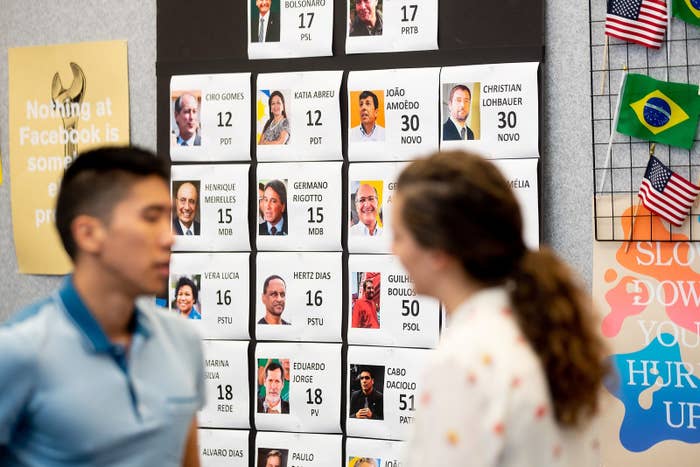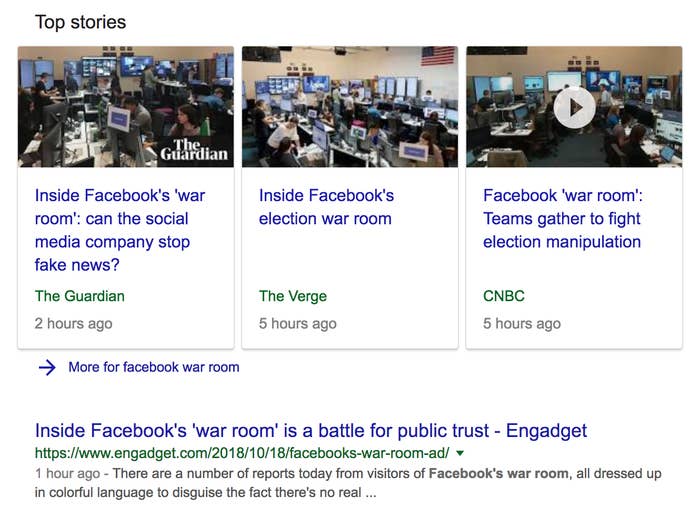
SÃO PAULO, Brazil — Brazil's biggest newspaper, Folha, released a bombshell report on Thursday that local marketing firms have been buying bundles of phone numbers and using them to mass-WhatsApp voters anti-leftist propaganda. The report was released the same day that WhatsApp's new CEO, Chris Daniels, published a piece in Folha, writing, "We have a responsibility to amplify the good and mitigate the bad."
Thursday morning, also, appears to have been the time when Facebook allowed access stories from American journalists such as CNN covering Facebook's new "election war room" to publish. The timing of the embargo — an agreement between news organizations to publish news provided by a source at the same time — the investigation by Folha, and Daniels' op-ed throw into question exactly how Facebook intends to monitor fake news and hyperpartisan misinformation, especially in a WhatsApp-dominated country like Brazil.
“We know when it comes to an [election], every moment counts,” said Samidh Chakrabarti, head of civic engagement at Facebook, who oversees the war room, told the Verge during their tour of the facility. “So if there are late-breaking issues we see on the platform, we need to be able to detect and respond to them in real time, as quickly as possible.”
Misinformation on WhatsApp has been a huge concern for Brazilian journalists and fact-checkers. About 40% of the country's 207 million people are using the app. Its messages are encrypted, which means it's virtually impossible to monitor exactly how political actors are using the app.
Facebook has been extremely aggressive about banning Facebook pages in Brazil in the lead-up to their election this month. But it's unclear what effect that has on WhatsApp, without breaking that encryption. In a September blog post, Mark Zuckerberg wrote that WhatsApp's and Facebook's moderators coordinate on banning malicious users.

“We don’t have a crystal ball. We’re not going to be able to predict every tactic,” said Nathaniel Gleicher, Facebook's cybersecurity policy chief, told the Guardian during their tour of Facebook's election war room. “Having all these teams in a room together will help.”
According to CNBC's write-up of the war room, people from both WhatsApp and Instagram are represented in the election integrity initiative alongside Facebook. What makes WhatsApp so different from Instagram or Facebook is that each message and private group is end-to-end encrypted — which means even the company itself can not read the messages. So it's unclear what WhatsApp could do to stop abuse on its platform without breaking that encryption.
This is how the WhatsApp misinformation campaign discovered by Folha worked. Marketing firms that supported far-right frontrunner Jair Bolsonaro used Bolsonaro's supporter database, as well as third-party databases of phone numbers. Some of these agencies were even offering a breakdown of location and income level. The firms then used a service called "mass shooting" to transmit thousands of messages.
Folha alleges that some of these firms purchased contracts for up to 12 million reals ($3.2 million USD). Not only is this an abuse of WhatsApp, but it is also illegal to do this in Brazil. Companies are forbidden from donating to political campaigns, and they are not allowed to procure a candidate's supporter database.
While it's impossible to know — seemingly even for WhatsApp's moderators — what's going on inside a private conversation or group — it is possible to monitor public groups. A WhatsApp monitor built by local fact-checking group Project Eleições Sem Fake shows that the platform is just as full of misinformation as Facebook.

Fabrício Benevenuto, an associate professor of computer science at the Federal University of Minas Gerais and the creator of the WhatsApp Monitor, told BuzzFeed News that the tool gathers data across 350 politically motivated WhatsApp groups. It pulls in images, videos, audio files, links, and text posts.
"We don't know the extent to which public groups represent private groups," Benevenuto said. "It is reasonable to assume that a malicious misinformation campaign might attempt to maximize the audience of a fake story by sharing it in existing public groups. So, we believe these groups are the front door for misinformation to reach the private groups."
Benevenuto was one of three researchers who published the results of a study in the New York Times on Wednesday night that found the majority of viral images scraped by their monitor contained fake information.
"From a sample of more than 100,000 political images that circulated in those 347 groups, we selected the 50 most widely shared," they wrote in the op-ed. "Eight of those 50 photos and images were considered completely false; 16 were real pictures but used out of their original context or related to distorted data; four were unsubstantiated claims, not based on a trustworthy public source. This means that 56 percent of the most-shared images were misleading. Only 8 percent of the 50 most widely shared images were considered fully truthful."
Bolsonaro's campaign has relied heavily on WhatsApp's unmoderated information — and he aims to make the service even more powerful if he becomes president at the end of the month.
According to a Datafolha survey, 60% of voters read most of their news on WhatsApp. Bolsonaro announced in a Facebook video on Saturday, that if he becomes president, he aims to change a rule created by WhatsApp that limits the number of simultaneous messages a user can send at once. He also wants to make it harder for Brazilian judges to suspend WhatsApp service in the country, which happened three times between 2015 and 2016.
A WhatsApp spokesperson told BuzzFeed News that they are using spam detection technology to moderate the platform.
“WhatsApp has proactively banned hundreds of thousands of accounts during the Brazilian election period. We have best-in-class spam detection technology that spots accounts that engage in abnormal or automated behavior so they can’t be used to spread spam or misinformation," the spokesperson said.
BuzzFeed News has reached out Facebook for comment.

